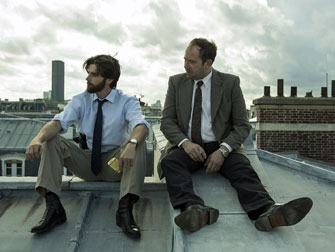
Most crime dramas thrive on ever-increasing tension, long car chases and bloody shoot-outs, so the fact that Frédéric Tellier’s new movie has very few of these elements makes it refreshingly distinctive. Focusing on the police investigations into the murders committed during the 1990s by the notorious Paris serial killer Guy George, the director explores the mundanity of the day-to-day work of detectives at a time (still so relatively recent) when DNA evidence was not yet admissible in France and investigators lacked modern scientific technology (or even mobile phones) to assist them.
The film cuts back and forth between the error-strewn years of investigation and the trial of Guy George in 2001. Given the fact that most viewers will know the outcome of the trial, the scenes depicting the various wrong turnings and people erroneously arrested lack dramatic tension and tend to drag (this is yet another movie lasting two hours that could easily have had half an hour lopped off).
What makes L’Affaire SK1 so watchable is Tellier’s decision to focus on failure rather than success. We follow the young investigator Magne (nicknamed Charlie by his colleagues, as in Charlemagne, and played by Raphaël Personnaz), who is hard-working and well-meaning but rarely gets things right or is in the right place at the right time. And, rather than concentrating on the victorious prosecution team, we follow the defense team, played by William Nadylam and the always excellent Nathalie Baye, as they interact with the charismatic, troubled serial killer (acted with sensitivity and panache by Adama Niane).
Of all the characters, Magne is the only one whose personal life is explored as he and his wife set up house and have two daughters, but strangely, this adds little to our understanding of his psychology.
Personnaz is an elegant and easy-on-the-eye actor, but he is forced to play the part of someone who lacks complexity, not helped by the underwritten role of his wife, who seems there solely to embody perfection and to say bland things like, “I know you aren’t listening to me, but I still love you,” and to step voluptuously naked out of the bath.
Whether this is deliberate or not, the camera lingers over her body as long as it does over each successive naked and bloodied murder victim (all of whom have perfect figures); some may argue that such detailed observation is necessary, but it made me uncomfortable.
Even with these misgivings, L’Affaire SK1 is worth seeing for the excellent acting, sumptuous photography (Paris has never looked so stunning) and unusual treatment of what could so easily have been turned into a generic crime thriller.
Favorite
